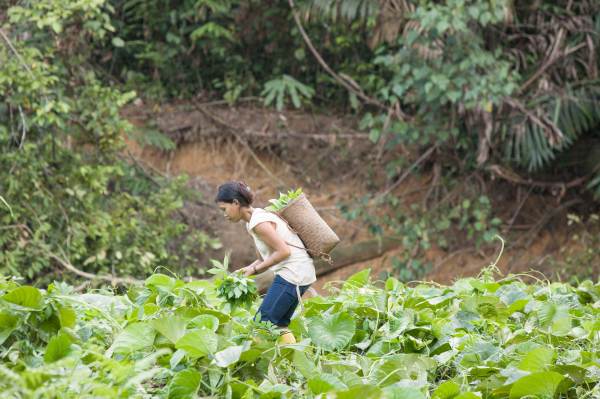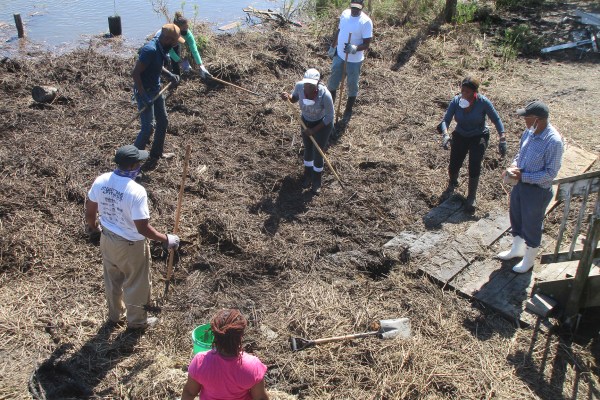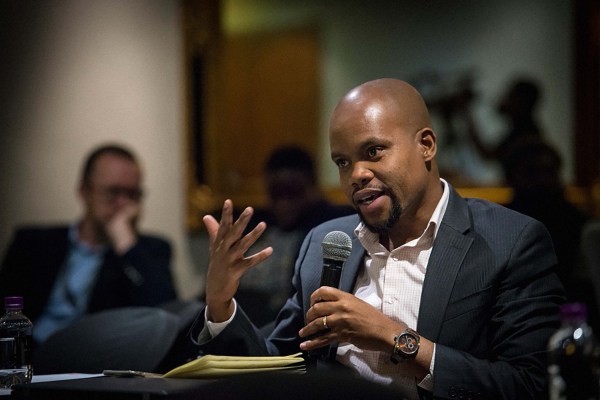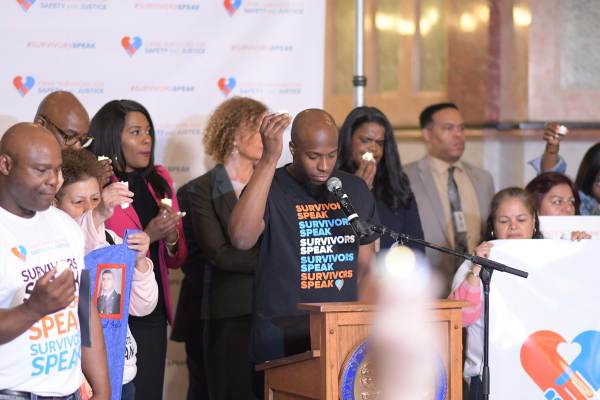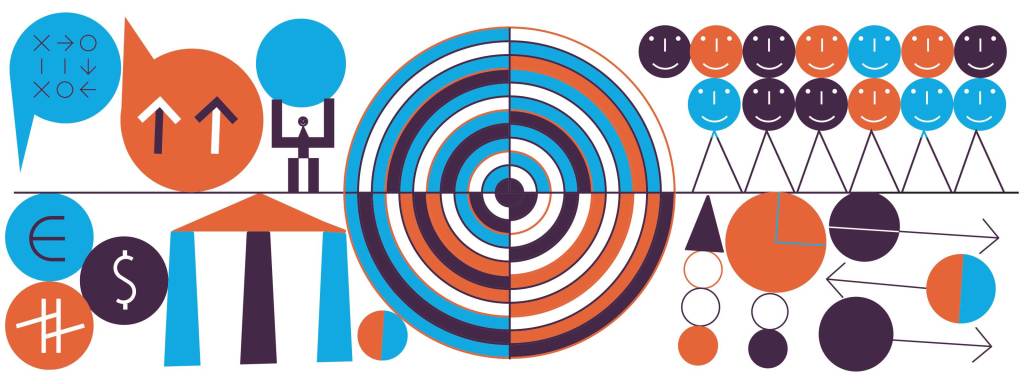 Federico Jordán
Federico JordánIn 2016, Haydeé Pérez Garrido had recently taken the reins of Fundar, a research and advocacy organization focused on promoting democracy in Mexico and funded by Ford’s Building Institutions and Networks (BUILD) program. Like her colleagues, she was committed to the cause and had worked at the center for years. A nonprofit with roughly 40 staff, Fundar had long operated as a horizontal organization where the staff felt empowered and leadership’s decisions, particularly when it came to funding, were frequently questioned, making challenging the status quo difficult.
But, with this new opportunity ahead of her, Pérez started to do what she—and Fundar—did best: analyze. She put the organization, from its impact to its operations to its funders, under a magnifying glass. Fundar has a strong reputation in Mexico since it was established in 1999, but it was not without its challenges. While many of its priorities were driven by the staff, the center had also fallen victim to the priorities of its funders, building entire programs at the behest of donors and pivoting strategies to fit their visions. While Fundar was impactful on many fronts, it didn’t have the monitoring and evaluation systems in place to increase its impact and, for an organization aiming to influence public policies and institutions, that kind of data and analysis was essential.
Pérez wanted Fundar to stop feeling instrumentalized to follow its funders’ priorities, restore its sense of agency, and develop a strategic vision grounded by the team’s years of experience and the critical human rights issues facing Mexico. After all, they knew the biggest problems facing the people of Mexico better than any donor could.
Unfortunately, Fundar was not an outlier. The challenges it faced are all too common for social justice organizations of every size and every sector, no matter where they work in the world. Organizations need sustainable, flexible support to build a strong, resilient foundation, respond quickly to unexpected challenges and seize opportunities to increase their impact. The work of tackling inequality is immensely hard, but keeping a social justice organization up and running is nearly impossible—and it shouldn’t have to be. BUILD was born from the belief that trust, collaboration and transparency should be at the center of all of our partnerships.
That’s why, in 2016, the Ford Foundation gave Fundar one of the very first grants under our BUILD initiative, a five-year, $1-billion effort to strengthen hardworking institutions and amplify their impact. BUILD provided Fundar with the multi-year, flexible funding it needed to drive real change, both inside and outside the organization. It helped Pérez and her team look at its operations candidly and assess what was—and wasn’t—working within the organization. And, most importantly, it put Fundar in the driver’s seat, so Pérez and her team could choose the areas they wanted to prioritize, with the flexible funding necessary to make it happen.
The result has been transformative. Fundar built a monitoring and evaluation system to bring more rigor to its work and measure the performance of public institutions to advocate for policy changes. Pérez and her team shut down programs created in response to funders’ requests and replaced them with new programs to address rising concerns in Mexico, like agricultural workers’ rights (and, as a result, earned a spot on the country’s discrimination prevention commission, helping to bring more voices to the table). They had tough conversations with donors and cut ties with those they felt didn’t support their strategic vision. They became more aligned as a team and as an organization. And they strengthened their position within Mexico’s civil society, allowing them to collaborate with other organizations for even greater impact.
“BUILD has given us the freedom to build our own path, to be able to experiment as an organization and thus be more effective in combating the privileges of a few and in defending the rights of the people in most vulnerable situations,” Pérez said. “Fundar was good before BUILD, but now we are much more strategic, resilient and we respond better to the challenges of the context.”
“BUILD has given us the freedom to build our own path, to be able to experiment as an organization and thus be more effective in combating the privileges of a few and in defending the rights of the people in most vulnerable situations.”
BUILD gave Fundar the push and oxygen it needed to breathe new life into its work—and its very being. But Fundar is merely one example. Over the last five years, our 340 BUILD grantees have shared countless similar stories. The National Domestic Workers Alliance employed its resources to create a digital platform to help domestic workers access cash relief and other benefits and establish worker councils to generate policy ideas and inform advocacy efforts, both of which became instrumental in response to COVID-19. BUILD grantees Organize Florida and New Florida Majority decided to join forces, becoming Florida Rising, to overcome operational barriers that impeded their shared vision to empower marginalized communities across the state to build political power. The African Women’s Development Fund leveraged its BUILD grant to put systems in place that enabled it to attract more financing and become part of Equality Fund, a global collaborative to deliver new momentum for women’s movements.
Our hypothesis that nonprofits would thrive with longer, larger, and more flexible grants had not only been proven—it defied our expectations. What started as an experiment to reimagine philanthropy has become our most impactful grantmaking to date. In BUILD’s first five years, more than 85 percent of BUILD grantees surveyed have strengthened their work to become more effective, and two thirds report that they have leveraged their grants into other funding.
We realized we couldn’t return to our old ways. That’s why we have committed $1 billion to continue this landmark initiative and support up to 300 organizations for the next six years. This continued effort builds on the foundation of trust and true partnership we’ve developed with them, and it comes at a critical juncture for social justice organizations—and for philanthropy.
When we initially rolled out BUILD, Ford was an 80-year-old philanthropy admittedly set in its ways. We needed to reassess how we operated as a funder—and we heard it often from our grantees. I’ll never forget what Jawole Willa Jo Zollar, the founder of Urban Bush Women, told our board, expressing her frustration with funders and their restrictions: “You [funders] starve us to death and we’re not able to do our best work.”
Having spent 20 years of my career leading a nonprofit, I shared her frustration because I experienced firsthand the power dynamics between organizations and their donors. I knew we at Ford had a responsibility to shift that power, putting the agency back into the hands of nonprofits, and establish a circle of trust grounded in listening and understanding. It wasn’t always easy, but we knew it was a risk worth taking because the returns had enormous potential: a meaningful, enduring impact on vital organizations—and society as a whole.
Accessibility Statement
- All videos produced by the Ford Foundation since 2020 include captions and downloadable transcripts. For videos where visuals require additional understanding, we offer audio-described versions.
- We are continuing to make videos produced prior to 2020 accessible.
- Videos from third-party sources (those not produced by the Ford Foundation) may not have captions, accessible transcripts, or audio descriptions.
- To improve accessibility beyond our site, we’ve created a free video accessibility WordPress plug-in.
Today, as the world faces a confluence of crises, that risk has become a requirement. Nonprofits and the critical services they provide have never been more essential, and yet they have never been more in jeopardy. A recent survey of nonprofits across 122 countries found that 73 percent have seen a decline in contributions in the last year, while 40 percent reported increased costs, staff disruptions and disruptions to the people they served. What’s more, half say they expect to see revenue decline by more than 20 percent this year.
COVID-19 has magnified cracks in our broken systems—and philanthropy is no exception. We need to confront our past, a past clouded by colonialism, white supremacy and a lack of representation, and seize this historic opportunity to reimagine philanthropy to accommodate the post-pandemic future. That demands us to shed the magical thinking that important change can happen quickly—advanced by small, short-term grants. It requires letting go of the reins, loosening rigid, restrictive frameworks and instead adopting a long-term, truly collaborative, fully flexible approach to grantmaking. It urges us to remember that progress isn’t linear, that social justice is not measured in years, or even decades.
We are already seeing foundations like Claneil, Haas, Jr. Fund and Raikes Foundation and individual donors like Mackenzie Scott provide the majority of their funding in the form of flexible, multi-year grants. And we have learned so much from our partners, such as the William and Flora Hewlett Foundation, the Weingart Foundation, and all the Trust-Based Philanthropy funders that paved the way for flexible funding and inspired the thinking behind BUILD. The last five years have been an eye-opening journey, pushing us to shift our institutional practices and increase our general support from 36 percent to 70 percent in our overall grantmaking. Why? Because our program team has seen the benefits and recognize it’s a much more effective way to work towards impact, enabling the organizations we fund to be free and nimble in creating the future they envision.
As we prepared to launch our latest version of BUILD, we knew we had to meet this moment by not only helping our grantees to strengthen and stabilize but also make them more resilient.We borrow from a study by the S.D. Bechtel, Jr. Foundation, defining resilience as “the ability to respond effectively to change and adapt successfully to new and unforeseen circumstances while staying true to mission.” “At their best,” the study continues, “resilient nonprofits respond to disruptions as tipping points, rather than tragedies, finding new opportunities to learn, grow, evolve, and, ultimately, better serve their communities.”
That, in essence, is our goal. Our hope is for the organizations we fund to ultimately embody that resilience, from their finances and strategies to their systems and people. We know how difficult it is to answer the call for justice when the weight of the world is upon you. These organizations are stepping up to today’s challenges; now it’s on us, the funders, to follow their lead and join them in the fight.
We didn’t create BUILD only to support our grantees through this unprecedented crisis—this is support that’s needed every year, every day. Nonprofits play an indispensable role, but philanthropy too has a special responsibility. If we can recognize the situation in front of us warrants action, examine our own practices and evolve to meet the needs of our rapidly changing world, we can become smarter, more effective partners to the organizations we fund and build a future grounded in equality, together.

